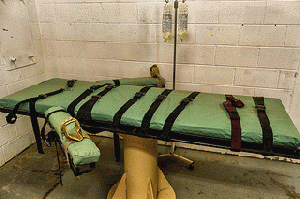| Back OpEd News | |||||||
|
Original Content at https://www.opednews.com/articles/Law-Profs-SCOTUS-Should-F-by-Jose-Cornejo-Death-Penalty_Lethal-Injection_Supreme-Court-150508-586.html (Note: You can view every article as one long page if you sign up as an Advocate Member, or higher). |
|||||||
May 8, 2015
Law Profs: SCOTUS Should Focus on Risky Execution Drug, Not Activists
By Jose Cornejo
In a new op-ed, Harvard Law professor Charles Ogletree and University of North Carolina Law professor Robert Smith argue that the issues raised about death penalty activists and drug shortages have no bearing on the core issue in Glossip v. Gross.
::::::::
Last week, the U.S. Supreme Court heard a lethal injection case from Oklahoma, Glossip v. Gross, which focused on a challenge to a specific drug, midazolam. The case centers on whether midazolam, a drug which has been used in multiple botched executions, can protect prisoners from cruel and unusual suffering during executions, given its inherent limitations as a drug.
At oral argument, however, some Justices pursued a line of questioning that went beyond the fact that midazolam has no pain-relieving effects and isn't FDA-approved for use as a stand-alone anesthetic. Justices Scalia, Alito and Kennedy wondered aloud if their ruling inGlossip should consider midazolam's use against the alleged backdrop of anti-death penalty activists preventing "better" drugs from being available.
A new opinion editorial in today's Washington Post powerfully argues that it should not. In"What Justices Alito and Scalia Overlooked on the Death Penalty," Harvard Law professor Charles Ogletree and University of North Carolina Law professor Robert Smith argue that the issues raised about death penalty activists and drug shortages have no bearing on the core issue in the case:
"The fact that some pharmaceutical companies do not want to sell execution drugs to state corrections departments tells us nothing about whether Midazolam presents an intolerable risk that Richard Glossip will endure gratuitous suffering if the drug is used to render him unconscious."The piece goes on to argue that even in the unlikely event that "some loosely defined group of 'death penalty abolitionists' coerced billion dollar, multinational pharmaceutical corporations into doing anything not in their self-interest," it's crucial to remember that the Petitioners in the case had no hand in those hypothetical events:
"But even if you accept the premise that "death penalty abolitionists" convinced Big Pharma to stop selling lethal injection drugs, it doesn't change the fact that Glossip is not an activist member of the death penalty "abolitionist movement," nor did he directly or indirectly lobby pharmaceutical companies to stop selling lethal injection drugs. As a condemned prisoner, he lives in nearly complete isolation on Oklahoma's death row. He did not waive, and the Court should not ignore, his right to be free from gratuitous suffering based on the activities of some unnamed political activists whom he presumably doesn't even know."As "What Justices Alito and Scalia Overlooked on the Death Penalty" argues, Glossip v. Grosspresents an important question of whether midazolam will cause pain and suffering in lethal injection executions which would violate the Eighth Amendment's prohibition on cruel and unusual punishment. Other considerations about perceived factors influencing the lethal injection drug supply simply aren't relevant.
Authors Bio:
Jose Cornejo is a recent graduate from the University of Wisconsin.
